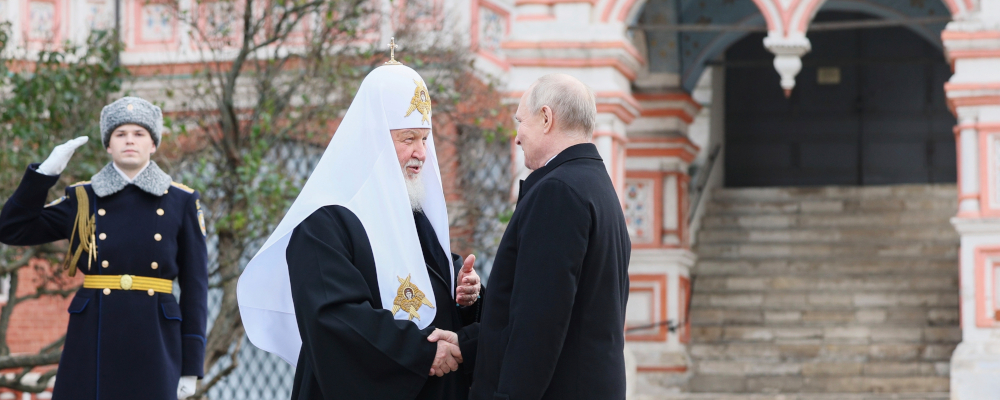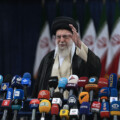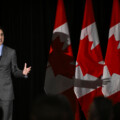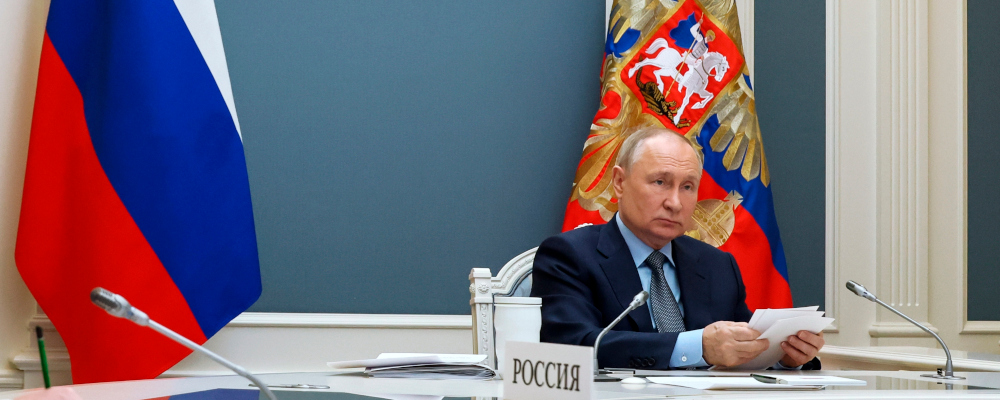The Russian invasion of Ukraine is almost 700 days old now, nearing two full years since February 24, 2022, when tanks and troops crossed the Ukrainian border at dawn. But, of course, that isn’t really when conflict began, but when it escalated. You could say that it began almost 3,600 days ago, since it was nearly ten years ago that Russia seized Crimea: a prosperous piece of land internationally recognized as the sovereign territory of Ukraine. The history of Russian aggression against its neighbours, though, is far older than even that, as even a cursory glance at history will show.
The present war is sadly only the latest development in an old process of usurpation and theft. It began in the late 14th century when the rulers of Moscow annexed parts of the eastern Slav lands centred on Kyiv, collectively known as Rus’. This was a cultural and geographical term, not a political one, but the Grand Princes of Moscow began to appropriate it, and to subordinate Kyiv’s political and ecclesiastical institutions to those of Moscow—a series of developments which culminated in the annexation of nearly all Ukraine by the end of the 18th century. Many attempts at secession failed until Ukraine voted to leave the failing USSR in 1991. And to this day the state centred on Moscow still calls itself “Rossiya,” and seeks to rule over the old Rus’ heartland and to co-opt its legacy.
Russia’s self-image as an imperial power takes shape within its literature also. Consider one of the very first Russian novels A Hero of Our Time published in 1840 by Mikhail Lermontov. It is the portrait of a highly unsympathetic person, Grigory Alexandrovich Pechorin, and his adventures in the Russian Caucasus and its environs. When I read it in school, I met for the first time such names as the Darial Gorge, Kerch, Taman, and Crimea—strange and wild places which I struggled to imagine but which now sadly feature in international headlines because of the war in Ukraine.The fictional Pechorin is the type of aristocrat who would have participated in that imperial project, and who would come to dominate Russian political life. He is the archetype of the lishniy chelovek, or “superfluous man,” as we say in English: a wholly immoral person, bereft of principles and beliefs, highly cynical, melancholy, and monstrously arrogant. He is what we would now call a nihilist. Lermontov intended Pechorin as an amalgam “of all the vices which flourish, full-grown, amongst the present generation.” And by that, Lermontov meant the rising cohort of well-to-do Russians in the early 19th century.

This was prescient, though it was not the Pechorins who overthrew and replaced the old order in 1917. They had, however, prepared the way. It is hard to imagine Lenin’s triumph without the 19th-century nihilists—Nikolay Chernyshevsky, Alexander Herzen, and Mikhail Bakunin, to name only three. Their relentless attacks on religion, hierarchy, morality, and the traditional social order had impressed the Bolsheviks and given them strength, despite little public support. Nevertheless, unlike the nihilists, Lenin and his followers had altogether too many convictions, not too few. And, for a brief moment, the nihilism of the past seemed to give way to visions of a new, and (as some people thought) a better world. But the cynicism and nihilism of Pechorin were to return amidst the drab misery of the Soviet project.
Something like this process has happened again recently. The exhilaration of perestroika and glasnost did not improve the late 1980s Soviet system so much as provoke its collapse. The seemingly limitless possibilities of Yeltsin’s liberalism ushered in a blend of extreme wealth and freedom for the few with anarchy and poverty for the many. Cynicism returned and mutated into apathy and nihilism. From the evil morass of nihilism and national humiliation emerged Vladimir Putin, the ultimate superfluous man of our time, who exchanged one form of authoritarianism for another.
That transformation is consummately explained by Soviet-born journalist Arkady Ostrovsky. His book The Invention of Russia describes the return of authoritarianism and its legitimation through a series of television narratives which shaped Russian self-image. Those who lamented the collapse of the USSR and the humiliation of Russia blamed the policies of the late 1980s. They especially accused Gorbachev’s policy of openness and transparency (glasnost in Russian) which had thoroughly irradiated and dissolved the bogus reality created by the Soviets. All the contradictions and paradoxes of the old regime were exposed, along with the sordid facts of history which had embarrassed the regime. The Soviet-Nazi non-aggression pact, the purges and repressions, the denunciation of Stalin, the struggle between nationalists and liberals—those events, their meaning, and even their reality were contested between the Soviet old guard, liberals, and nationalists, as the future of Russia hung in the balance in the 1990s. Battle lines were drawn across the mass media, and Putin’s victory was achieved through total control over national television.
Tighter control of television media was merely the latest iteration of the Russian state capacity for making people believe things that are not true and suppressing information that might inspire criticism. The old Soviet news broadcast Vremya, for instance, disseminated the Kremlin’s view of everything, reassuring its nightly audience under the pretence of objectivity that all was well. Vremya is still in operation despite a hiatus between 1991 and 1994, and it remains the principal source of news for an audience of some 82 million Russians. But it isn’t just Vremya now, and the appearance of objectivity is gone. Every programme on every television channel broadcasts the Kremlin’s narratives non-stop. Unsurprisingly, the main force of contemporary propaganda is the war in Ukraine, in which Russian “heirs to the Red Army warriors” battle Ukrainian “Nazis,” “Satanists,” “terrorists,” and so on, who are controlled by “Anglo-Saxons.” China’s Xi Jinping is “wise,” “brilliant,” and “mighty” on account of his apparent friendship with Putin. But other world leaders, especially those who interact with Ukrainian President Volodymyr Zelenskyy, are evil; and on account of a curse transmitted by Zelenskyy they inevitably meet with political disaster like Boris Johnson or death like the late sultan of Oman, Qaboos bin Said.
As outrageous and incredible as all that sounds, much of it has reached the West through influencers on Twitter, broadcasters like Tucker Carlson and Alex Jones, and even some commentators and politicians. They also transmit and repeat many of the narratives with which the Kremlin surrounds itself. Chief among these is Putin’s imaginary vision of Russia as a bastion of “traditional values” besieged by an “empire of lies,” as he himself has put it. For his boosters, Putin is a “defender of the family and God,” who appeals to many conservatives abroad. And irrational Western hostility to Russia is akin to “cancel culture.” Or so we constantly hear from certain voices.
But is any of this true? Is contemporary Russia genuinely a traditional society? If it were, the return of the old ways would be nothing short of miraculous after two centuries of nihilism and communism. But, alas, this is not the case. Despite a boom in church construction, only about 6 percent of the Christian population attends church regularly in Russia. For comparison, regular church-goers in the USA are about 31 percent of the Christian population. Other comparisons are even less favourable. The ex-Soviet countries have some of the highest rates of abortion in the world. In Russia, the rate of abortion has fallen dramatically since the Soviet era, but there are still about 53.7 abortions per 1,000 women; in America, the number is 20.8. Russia has the third highest annual divorce rate in the world at 3.9 per 1,000 marriages; America is at 2.3. Rates of infidelity in America are slightly lower (about 21 percent) than in Russia (26 percent). The prevalence of HIV/AIDS in America is about 0.4 percent of the population and falling; in Russia, it is 1.5 percent and growing. As for the idea of defending traditional family-formation, Russian oligarchs and senior statesmen notoriously maintain multiple mistresses and parallel families; and Putin himself, who is divorced and has sired multiple children out of wedlock, is no exception.
As an Orthodox Christian myself, I take no pleasure in saying that the Putinist defence of God is also rather weak. Kirill, the Patriarch of Moscow, is a former spy with an embarrassing fondness for garish Breguet watches, his $4-million yacht, $43-million private jet, and small real-estate empire in Moscow and St Petersburg. He also has an odd penchant for public blessings of nuclear weapons. Apart from supporting such militancy, the church that he runs is essentially an organ for disseminating domestic propaganda. This is why, under the so-called Yarovaya Law, all forms of worship and spreading of faith are illegal unless conducted within government-approved churches or other recognised religious sites.

Putin and his servants may talk the claptrap of conservatism and the defence of Orthodoxy, but they do not practise what they preach. They are more devoted to appearance than to reality. When criticised for this, they readily pivot to whataboutism, just as the old Soviets did. The West, they say, is equally hypocritical but better at hiding it, so why single out Russia? But this is quite unpersuasive. It is easier to find Westerners eager to denounce the flaws or downright evils of their own heritage than those of Russia. And, if anything, we suffer from too much internal criticism, not too little. Defences of Western civilisation, western Christendom, European and American customs, political liberalism, and so on, tend to be rather anaemic and studiedly qualified. And that diffidence opens the way to Russian agitprop, peddling the theory of a foreign strongman who stands up for his own heritage, even if he has to appropriate it from abroad.
But that is not the most sinister aspect of Russian propaganda in the West. It is rather the capacity for covering frustrated Westerners with a miasma of Pechorin-like apathy. The disease of postmodernism has left many of us unable to dispel it, since the idea of objective truth has fallen out of favour, especially in our universities. Accordingly, we are all too susceptible to believing half-truths and even outright nonsense. If your preferred political candidate didn’t win, for instance, the reason is that the election was rigged and your cause is hopeless. If you are frustrated by incomplete information about the war in Ukraine, you should give up because you will never know the truth. All political decisions are made by a shadowy international cabal who manipulates your politicians from above, so there is no point in voting. How do you know whether or not a specific government document is fake? Your elites hate you, so give up. The propaganda is an invitation to disengage from politics and social life; and when those talking points reappear in the mouths of Western commentators, they are taken as evidence that Russia, however bad it may be, is no worse than the West.
Like all good propaganda, it contains a small element of truth. Both Russia and the West do indeed suffer from many of the same illnesses. Both are afflicted by forgetfulness of history, social atomisation, excessive faith in technology, political apathy, and a widening gulf between the rich few and a poor multitude. And yet, those problems are all far worse in Russia, which has been ruled and abused by superfluous men for 200 years at least. The past two centuries of Russian history are accordingly strewn with the ruins of broken institutions, shattered utopian dreams, and national humiliations. No model of associational life free of state control has survived. The consequences of this are represented in two statistics: a quarter of the Russian population regularly feels lonely, and about 80 percent of adults claim to be surrounded by people who share their views on almost everything—signs of advanced atomisation and de-politicisation of society. The seemingly universal support for the war in Ukraine likewise represents extreme alienation of everyday life from politics, and the inability of Russian citizens to adopt their own political positions on events. Finally, the great Western disease of postmodernism is more acute in Russia, where the power of the Kremlin dictates what is true, and Alexander Dugin’s theory of a peculiar “Russian truth” is nothing more than an exaggerated form of relativism.
What this calls for in the West is a far more vigorous defence of our own traditions and heritage than we are used to. We can start by acknowledging that a good many traditional ways of life have survived better in the West, especially in North America, than elsewhere. Consider the Mennonites, Lubavitcher Jews, the Russian Orthodox in exile after the Bolshevik revolution, the Iranian royal family, or French Catholicism in Quebec—they are all communities who have flourished better abroad than in their place of origin.
We must also do away with relativism and postmodernism, and re-dedicate ourselves to objectivity and unanimous truth. Otherwise, the consequences will be grim, and we will be like Lermontov’s description of the people of Pechorin’s generation:
…we are no longer capable of great sacrifices, either for the good of mankind or even for our own happiness, because we know the impossibility of such happiness; and, just as our ancestors used to fling themselves from one delusion to another, we pass indifferently from doubt to doubt, without possessing, as they did, either hope or even that vague though, at the same time, keen enjoyment which the soul encounters at every struggle with mankind or with destiny.
Such an attitude is yet more prevalent in contemporary Russia than it was in the early 19th century, and it is already well advanced in the West. The fate of Moscow will be ours if we allow ourselves to become nothing but ambitious, self-absorbed nihilists.
And so, Russia is indeed an example to us, but not as their right-wing boosters would have it. Twenty-four years of Putinism were built on two centuries of decay. Far from a vision of a renewed West, Russia shows us how much worse the West shall be if we continue down the same road of forgetfulness, apathy, and nihilism. One day, like Pechorin, we may find that we can still look back upon our ancestors’ achievements, but we will not be able to understand or imitate them, and we will not even want to.
Recommended for You

The Notebook by Theo Argitis: Mark Carney’s first major tests

Falice Chin: The ‘wild and weird’ Calgary Stampede

Michael Bonner: Are we witnessing the last gasp of Iran’s Islamic Republic?

Need to Know: Yahoo, Alberta! You’re doing something right



